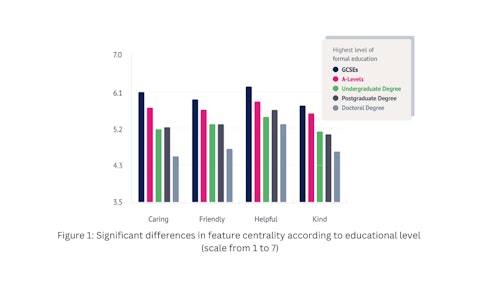Insight #2: Academically higher-educated professionals consider some of the more human-centric characteristics less central to good leadership.
Professionals with higher education levels consider it less central that leaders are caring, friendly, helpful, and kind compared to their colleagues who have received less formal education.


This finding raises questions regarding the idea and practice of good leadership promoted in universities. Many of the top academic institutions take pride in saying that their students are the leaders of the future, yet there is often little embedded into their programmes to support leadership development, and even less with an explicit focus on character.
Universities often focus on intellectual competencies and some character qualities, such as cognitive complexity, analytical skills, and critical thinking. Whereas other character qualities, like being caring, friendly, helpful, and kind, are neglected. Without the proper support of these human-centric qualities, we risk developing robotic leaders who are full of knowledge but lack wisdom; who possess all the technical skills to perform tasks but fail to understand humans.
In the case of these highly educated robotic leaders, their potential strengths, like competencies and some character qualities like critical thinking that they have developed, can operate as excess vices. These have inflection points where they can become harmful when unsupported by a robust set of character qualities. For example, a critical thinker can become overly critical without the support of kindness and friendliness, which leads to people feeling undervalued and compromises potential. We don’t suggest dialling down strengths but strengthening under-developed character qualities, like being helpful and kind, alongside strengths to better support them.

To be sure, one does not have to choose between character and competence when it comes to training future leaders. If anything, character will enhance students’ capacities to become better professionals in any industry. For example, Toto Wolff, the team principal of the seven-time champion Formula 1 team Mercedes, says that character is at the heart of their recruiting and selection. He insists that for organisations to be successful, they need to place character qualities, like integrity, loyalty, and honesty, as a priority.
Elevating the more human-centric character qualities alongside competence in higher education is a group effort. Here is what you can do no matter where you are situated:
1. Industry: Embed a robust set of character qualities into the recruitment process to signal to students and educators that characteristics like being kind and helpful are just as important as being cognitively complex, analytical, and a critical thinker.
2. Education: Find creative ways to embed neglected character qualities into the courses you are already offering. While curriculum real estate in academia is in short supply, teachers can focus on their own character so that they can model this behaviour to students and integrate it into discussions alongside competencies.

3. Students: Focus on developing your neglected character qualities alongside your strengths and competencies. You can refer to the Oxford Character Project’s seven strategies for character development to support your efforts. We encourage you to practice these with your classmates, professors, and friends. Modelling these human-centric qualities will create a ripple effect and encourage people around you to embody them as well.
4. Parents: Sustain a robust set of character qualities in conversations with your children and model good character for them to follow. Being caring, friendly, helpful, and kind are emphasised at younger ages, and this doesn’t need to change with the development of competencies.
We encourage you to reflect on how you can introduce more human-centric character qualities into your contexts – at your home, workplace, social circles, and any other communities where you belong. Bring this reflection into action by practising more kindness or any other undervalued character qualities this week.
Dr Corey Crossan is a Research and Teaching Fellow at the Oxford Character Project, where she develops and facilitates character development programmes for students, industry, and university partners. Her research examines how character can be developed and its impact on performance and well-being. Learn more here.
Anjali Sarker is a Programme Manager at the Oxford Character Project, where she is leading a wide range of programmes that promote value-based leadership among students and professionals. She has a background in international development and social innovation with a focus on leadership and human development. Learn more here.
